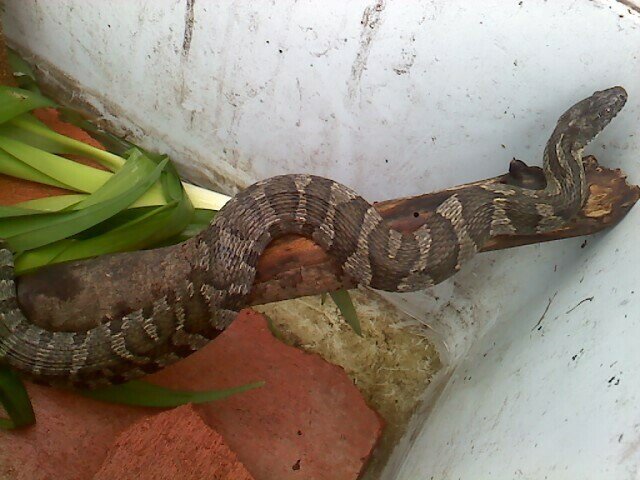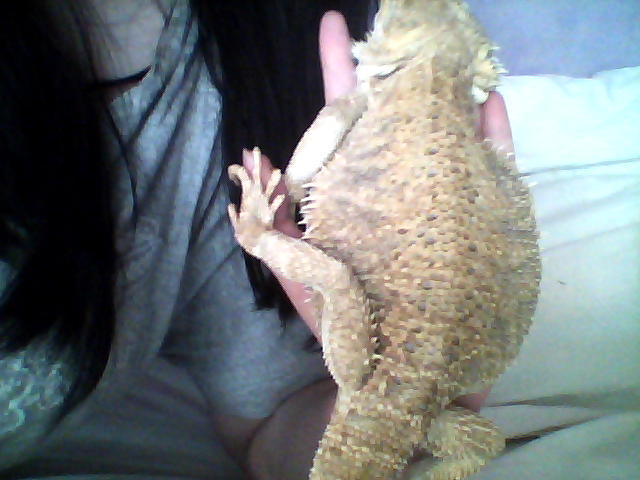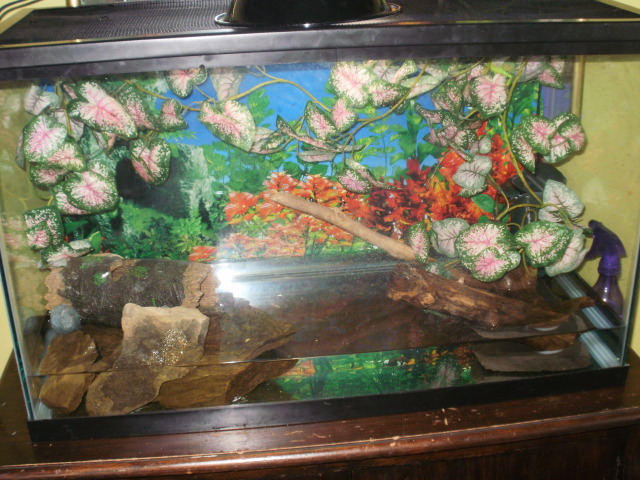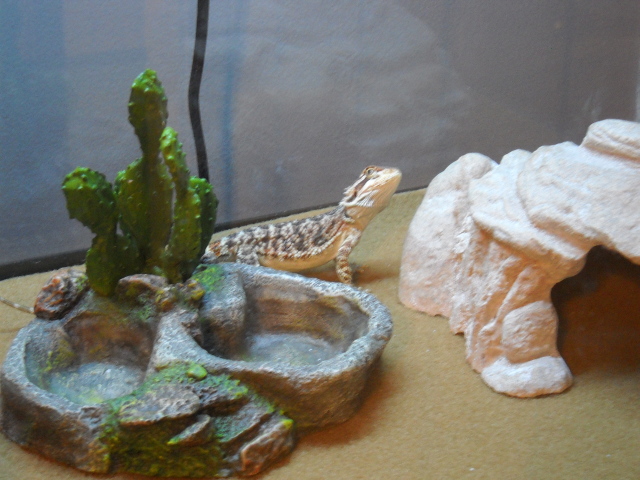QuestionReally I have two questions. First, is there a way to train a leopard gecko to stay still (like on your shoulder) or to teach him to walk into your hand. My gecko is still a juevinille a skittish when i touch him. Secondly he seems to breath quickly, but im not sure if this is abnormal, and i have seen mouister around his nose. Could this be a problem?
AnswerHi Bob,
Many leopard geckos prefer not to be handled...I really know of no one that has "shoulder trained" their gecko. With them being so small, and very fast, I don't recommend trying to shoulder training as that a fall from that height could harm them severely. With walking on your hands, if you happen to have a gecko that is ok with handling, then sure, no problem with them climbing on your hands. What I do with mine is the "hand over hand" movement. Meaning they crawl from one hand to the other by you putting your hand in front of the one he is on and when he is on that hand, you put the other hand in front again and just continue to repeat this motion. I have two geckos, one loves to climb on me and do the hand over hand thing...the other prefers to try and get away. Its good to give your leo some free time to explore out of their cage. I use the bed for this...putting pillows on it for them to climb. They LOVE this free time. Of course be very careful they don't fall off the bed!! I let them climb on me during this time also. Most geckos are very protective of their tails, so when touching them, you have better results not touching their tail.
Now, for your second question: If your leo is breathing quickly all the time, I would get a vet that can treat reptiles to take a look...especially with the moisture coming from the nose. If you can feel a raspy feeling in his chest when he is breathing...this is an emergency vet vist as that it can be a sign of a respiratory infection.
Leos do not need a high humidity level. In fact, a high (over 40%) can be detrimental to their health with their lungs. If you are misting the tank, its best to stop doing that. If this is when your leo drinks, try misting outside of the tank to prevent excess humidity there. Do provide the humid hide though as that they do need that to help with shedding. I've included a basic care sheet for you to use with links to more information.
Leopards are pretty easy to care for but they do need
special care. Here are some of the basic needs of your
gecko.
HOUSING: The need to have at least a 20 gallon long tank for
one Leo. This needs to have a secure fitting screen top...they can be quite the escape artists!!! They need to have a humid hide box.You can make
this with something as simple as a small plastic dish with a
hole cut in one side and a small mesh bag filled with some
Sphagnum moss, coconut bark or Peat moss that you mist.
I use that on the warm side of the tank. Be sure to provide a cool hidebox on the other end. I use the critter caves which you can purchase. NOT the ones that have heat in them!!!!
Provide secure climbing areas for your gecko. Fake plants, rocks and branches are all fine to use.
SUBSTRATE:(that's the stuff on the floor of your tank) News
paper, lizard carpet or paper towels work great and are easy
to clean and are much safer than any loose substrate.
TEMPERATURES: They need a warm area of 88-90 degrees and a
cooler area in the upper 70s, low 80s. At night their
temperature can drop to the low to mid 70's.
Never use a hot rock for a leopard gecko...or any reptile.
They can severely burn any reptile. You can use a heating
pad under the tank, or you can use a regular household
lightbulb in a dome fixture with a ceramic socket in it to
keep the warm area at the 88-90 degree area.At night, no white light. If room temperatures stay above 70 degrees, no extra night heat is needed.
You can use the special nighttime lights that are designed for reptiles. I like using a ceramic heat emitter on a thermostat for nighttime heat.
DO NOT use black lights or party lights as they can cause eye damage!!!!
The wattage you use will vary based on room temperature and size of tank.
LIGHTING: Leopard geckos do not need UVB lighting but it does not hurt them to give them uvb. They should have some type of light during the day, be it a uvb tube, regular florescent light, reptile day light or regular household lightbulb. NO white lights at night!!!
FEEDING: Geckos should not be fed crickets or other insects that are bigger than the space between their eyes. Crickets and other food items such as silk worms, super, and an occasional treat of a wax worm, need to be dusted with a calcium supplement two times a week and also they should have a small dish of calcium in their tank. I use the lid of a milk jug for the little dish of calcium in their tank. For dusting the insects, Use a calcium with no added phosphorus.
Insects must be gut loaded(fed) for at least 48 hours prior to feeding your gecko. Remove any uneaten crix or superworms after 15-20 minutes..... Place a piece of cut potato in the tank so that if you have missed any uneaten insects, they will eat the potato instead of nibbling on your gecko!!!
You have to be sure to feed your crickets the right foods
before feeding them to your gecko. If your crickets/insects are not healthy and well fed, your gecko will not get the nutrition
he needs. You can gut load your crickets greens, veggies, cereals or specially designed commercial foods for crickets or the insects you are feeding.
Be sure to have a small dish of clean water for your gecko
at all times!!
You can offer them some baby food or fruits on occasion ...
Mine will even eat a small piece of watermelon now and then.
HANDLING: Some geckos enjoy being held...others prefer not to be handled at all. Be sure to be very gentle when holding your leo and NEVER grab them by the tail! Their tails are extremely fragile and will break.
I do suggest finding a vet that can treat reptiles BEFORE you actually need one!!! To find a vet that is able to care for reptiles:
http://www.anapsid.org/vets
For more information on leopard geckos:
http://www.thegeckospot.com/leocareindex2.html
http://www.drgecko.com
If you have anymore questions or don't understand something, please be sure to ask.

 beardie trouble
Question
agatha
hello, im Lucy and i have a Bearded Dra
beardie trouble
Question
agatha
hello, im Lucy and i have a Bearded Dra
 Unknown Snake.
QuestionSnake
QUESTION: I found this snake near
Unknown Snake.
QuestionSnake
QUESTION: I found this snake near
 New bearded dragon hi tracie
Question
little skinny perhaps
Hi Tracie...
I tried to
New bearded dragon hi tracie
Question
little skinny perhaps
Hi Tracie...
I tried to
 parasite in water dragon
QuestionQUESTION: My daughter has a Chinese water drago
parasite in water dragon
QuestionQUESTION: My daughter has a Chinese water drago
 Weird Bearded Dragon Behavior
QuestionQUESTION: Hi, Ive just a few questions on my be
Weird Bearded Dragon Behavior
QuestionQUESTION: Hi, Ive just a few questions on my be